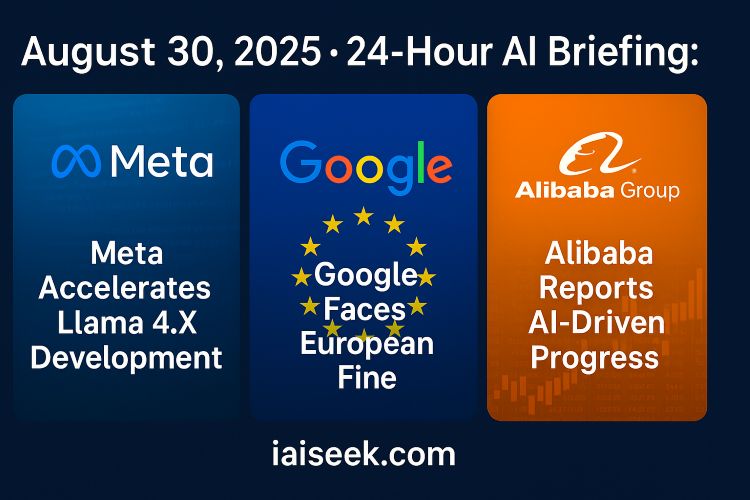AI Navigation
- articleAI Trends
- lightbulb_2AI Tips
- assistant_navigationAI Navigation
- heatHot Articles
- emergency_heat_2Hot Tips
- format_list_numberedPrompt Formatter
- psychologyTest Center(RPI)
August 30, 2025 · 24-Hour AI Briefing: Meta Accelerates Llama 4.X, EU Softens on Google Antitrust, Alibaba’s AI Revenue Keeps Surging
In the past 24 hours, the AI world has been marked by three key developments: Meta’s internal power plays and its push for Llama 4.X, the EU’s decision not to break up Google’s ad tech empire, and Alibaba’s record AI growth despite massive delivery app subsidies. Together, these events highlight three major themes: intense AI model competition, global regulatory ambiguity, and the growing financial weight of AI in corporate strategy.

1. Meta pushes Llama 4.X upgrade amid executive turmoil
Meta is fast-tracking the development of its next-gen AI model, Llama 4.X, aiming for a release by the end of this year. At the same time, newly appointed Chief AI Scientist Shengjia Zhao was reportedly close to rejoining OpenAI before being promoted internally.
Comment:
Llama 4 has struggled in practical use cases like code generation, reasoning, and instruction following. Market reception has been lukewarm. To catch up with OpenAI, Google, and Anthropic, Meta has aggressively hired over 50 AI experts—including 19 from OpenAI, 13 from Google, and others from Apple, xAI, and Anthropic.
Zhao’s near-departure and last-minute promotion underscore the fierce competition for elite AI talent. Meta’s quick move to retain him reflects its determination to stay relevant. Despite current doubts, the Llama series remains popular with developers due to its openness—whether Llama 4.X can restore Meta’s technical credibility remains to be seen.
2. EU won’t force Google to divest ad business in antitrust case
The European Union is set to fine Google over alleged ad tech monopolization, but the penalty will be relatively small, and the company will not be required to spin off any business units.
Comment:
The fine is too minor to meaningfully impact Google’s operations or deter future dominance in advertising tech. It also signals how difficult—and politically costly—it is to enforce structural changes like breakups against Big Tech.
Instead of issuing a formal split order, the EU seems to be opting for a compromise. That could open the door for more granular, transparency-based regulations down the line—but for now, Google’s ad empire remains intact.
3. Alibaba burns ¥14B on subsidies—but AI revenue steals the show
Despite reportedly losing ¥14 billion (~$1.9B) on delivery app subsidies, Alibaba’s Q2 earnings blew past expectations. Its U.S.-listed stock jumped 13% on Friday, the biggest single-day gain since March 2023.
Comment:
The ¥14B figure comes from analyzing Alibaba’s unusually high Q2 marketing expense of ¥52.7B, which was ¥20.8B higher than the same period last year. If not for the “food delivery wars,” a ~20% YoY growth would have been more typical—implying around ¥14B in additional spend.
But the market is far more interested in Alibaba’s AI play: Cloud revenue rose 26% YoY to ¥33.4B, and AI-related products have now posted triple-digit YoY growth for eight straight quarters. Its open-source AI models are seeing rapid adoption, boosting demand for compute and storage. In short—AI, not subsidies, is what’s powering Alibaba’s valuation.
For more real-time AI industry moves, market insights, and trend tracking, visit:
📌 AI chip turbulence, Snowflake’s rise, Gmail’s political filters
📌 NVIDIA’s earnings beat, TSMC’s 2nm plans, Anthropic’s national security agenda
Stay updated on the pulse of AI at iaiseek.com